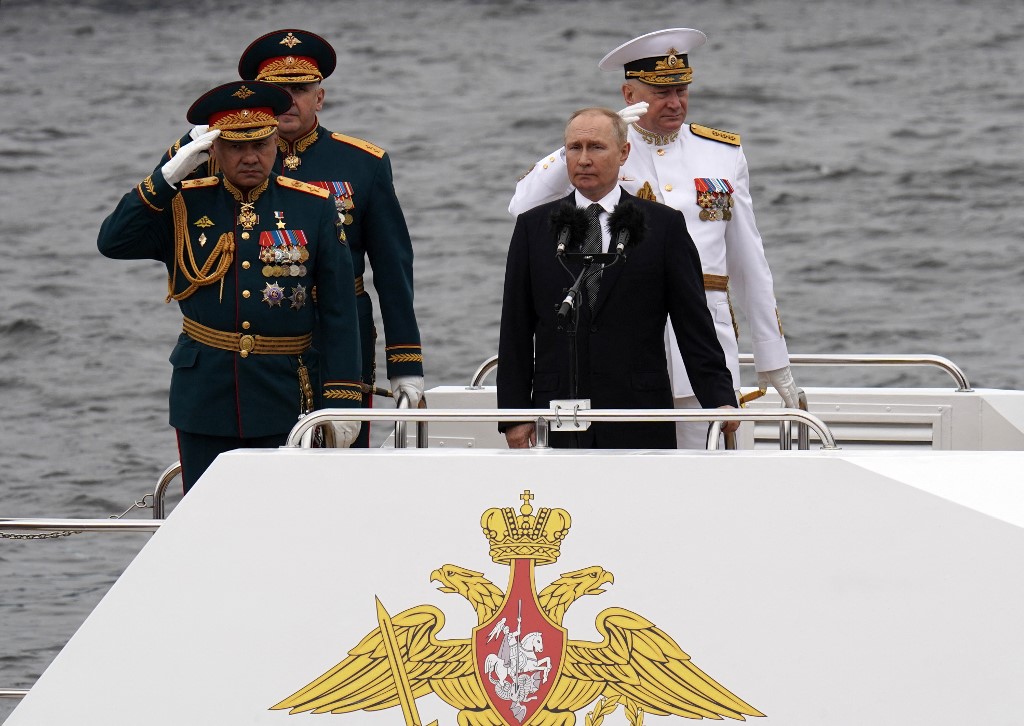Fatih Yurtsever*
Russian President Vladimir Putin adopted the Russian Federation’s new naval doctrine, which aims to ensure the implementation of the national naval policy, on July 31 in St. Petersburg during celebrations commemorating Navy Day. “Important areas” are defined in the doctrine as maritime areas of geostrategic importance that are vital for Russia’s economic development and can influence national and regional security. The naval doctrine emphasizes that the Black Sea, the Sea of Azov and the eastern Mediterranean are among the “important areas” where the Russian Navy must secure national interests from an economic and security point of view. As can be seen from these statements in the doctrine, Russia plans to soon expand its naval power in the Sea of Azov and the Black Sea. What risks and dangers does Russia’s growing naval power in these sea areas pose for Turkey in the long term?
The naval doctrine was first adopted in 2001 and was last updated in the summer of 2015 following Russia’s illegal annexation of Ukraine’s Crimean Peninsula amid NATO expansion efforts. Russia had to revise its naval doctrine to adapt to the changing geopolitical landscape after the beginning of the war with Ukraine. Under normal circumstances, doctrines are created for an extended period of time. However, Russia has suffered several naval setbacks during its invasion of Ukraine. Although the last update of Russian naval doctrine was only five years ago, the fact that the Black Sea Fleet’s flagship, the destroyer Moskva, was sunk by two Neptune anti-ship missiles fired from the Ukrainian coast on April 14 and Russian marines withdrew from the geostrategically important Snake Island off Odessa has forced Russia to amend the naval doctrine to keep up with the latest developments.
Yuri Borisov, the former deputy prime minister for defense, told Russian media that the naval doctrine had been adjusted to take into account “changes in the geopolitical and military-strategic situation in the world.” The new, 55-page Russian naval doctrine outlines the overarching strategic goals of the Russian Navy, including the ambition to become a global “great naval power” by streamlining resource mobilization under naval command, including civilian ships and crews, and the use of maritime infrastructure in wartime. Russia has a coastline of almost 40,000 kilometers. It has been emphasized in the doctrine that Russia should have a strong navy to maintain its existence and fight the actors that threaten its existence, as the main threat to Russia is defined as “the strategic policy of the US to dominate the world’s oceans” and the NATO military alliance near Russian borders.
Issues closely related to Turkey’s security in the doctrine are the statements about the Black Sea, the Sea of Azov and the Montreux Convention. Russia has fully occupied the Ukrainian coastline on the Sea of Azov, which has now become a de facto “Russian lake.” The doctrine provides for the Black Sea Fleet to expand its activities in the Sea of Azov and the Black Sea and strengthen its geopolitical position. Historical experience teaches us that whenever Russia has taken control of the Black Sea and the Sea of Azov, it interprets the rules and treaties regulating the passage of ships through the Bosporus and Dardanelles straits to its own advantage.
The doctrine says: “Attempts by some states to change the existing legal regime of sea areas and straits used for international navigation for their own geopolitical purposes pose a threat to Russia’s security.” From this, it’s obvious that Russia is currently using the Montreux Convention for its own purposes and perceives attempts to change it as a threat. In other words, there’s no problem as long as Turkey interprets the convention the way Russia interprets it. Under the Montreux Convention, for example, the passage of submarines through the straits is prohibited except for repairs. Turkey allows Russian submarines operating in the eastern Mediterranean to pass through the straits for repair work. However, if Turkey doesn’t interpret the articles of the Montreux Convention as Russia interprets them, e.g., preventing the passage of Russian submarines through the straits at the request of NATO or other littoral states, Turkey and Russia could clash on this issue. If Russia expands its naval power in the Black Sea and acquires new capabilities, it can increase its deterrent power against Turkey. The clues as to how Russia will do this are also hidden in the content of Putin’s speech, delivered after the signing of the naval doctrine in St. Petersburg.
At the signing ceremony, Putin also said the Russian Navy would take delivery of its new Zircon hypersonic missiles in a few months. Hypersonic missiles can travel at nine times the speed of sound and pose a major threat because of their low-observable characteristics. According to the Russian Defense Ministry, Russia has already conducted test launches of Zircon missiles from the Admiral Gorshkov frigate and the Severodvinsk attack submarine. Putin added that the deployment sites will depend on Russian interests, saying: “The most important thing here is the Russian Navy’s capability. … It’s capable of responding with lightning speed to anyone who decides to violate our sovereignty and freedom.” Russia currently has two Gorshkov-class frigates, with plans to build six more. The deployment of three or four Gorshkov-class frigates equipped with Zircon hypersonic missiles in the Black Sea shifts the balance of naval power in Russia’s favor. For this reason Turkey should closely monitor the Black Sea military activities of Russia, which has demonstrated its will to become a great naval power with its new doctrine, and take measures such as the deployment of Reis-class submarines with air-independent propulsion systems in the Black Sea that would shift the balance of power in Turkey’s favor.
* Fatih Yurtsever is a former naval officer in the Turkish Armed Forces. He is using a pseudonym out of security concerns.

